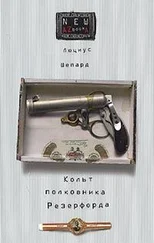In 1903 there was a reawakening of interest in the murders, new clues and rumors that struck close to the bone, and his family—none of whom he had seen since the beginning of his confinement—gave orders that he be moved from England, fearing that their awful secret would be brought to light. He was issued a German passport under the name of Gerhard Steigler, and one night in the autumn of that year, along with his warders, his doctor of the moment, and a trunkful of the drugs that kept his demon tame, he crossed the English Channel to Calais, and there entrained for Krakow in Poland. From Krakow he was transported by coach to a hunting lodge in the northeast of the country, a rambling structure of whitewashed walls and pitch-coated beams, set among rumpled hills thicketed with chokecherry, forested with chestnuts and stunted water oaks. Travel had rekindled his spirits somewhat, and during his first year at the lodge, he came again to derive a mild pleasure from life. He liked the isolation of the place, and he would walk for hours through the woods, often winding up atop a hill from which he could look westward over a checkerboard of cultivated fields, of wheat and barley and sorghum. Here he would sit and watch cloud shadows rushing across the land, great shafts of light piercing down and fading, the golden fields dappling with an alternation of bright and dark, and it seemed to him that this constant shifting display was an airy machinery, immaterial clockwork that registered the inner processes of time. He realized that but for a brief, bloody season, his life had evinced this same insubstantiality, this same lack of true configuration, and as the years slipped away, he returned each afternoon to commune with that vast, complicated emblem of light and shade, believing that therein he could perceive the winnowing of his days.
If he were to look eastward from the hilltop—something he rarely permitted himself to do—his eye would encounter a smallish town of thatch and whitewash and curling chimney smokes, its church steeple poking up like a rifle sight. There, he knew, would be women of the sort he fancied. The thought of their bellies gleaming pale, the neatly packaged meats of their sex awaited a knife to reveal their mysteries, that would start him trembling, and for days thereafter he would be overborne by his demon’s urges and have to be restrained.
During that first winter, in order to perfect his role as a member of the German aristocracy, he immersed himself in the study of the language. He had always been adept at learning, and by the time the spring thaw had arrived, he had become fluent in the spoken tongue and was capable of reading even the most difficult of texts. He enjoyed the works of Schiller and Nietzsche, but when he came to Faustus and its humanistic depiction of evil, he was so nettled by the author’s dearth of understanding that he hurled the book out the window. Demons were not nearly as personable as Goethe had described them. They were parasites, less creatures unto themselves than the seepage of a dark force that underlay all creation, that—presented with an opening—would pour inside you, seducing not your soul but your blood, your cells, feeding upon you and growing to assume hideous shapes. He had seen the nesting places of such demons in the bodies of the women he had slain, had caught brief glimpses of them as they scurried for cover deeper into their bloody caves.
Turning from literature, he developed an interest in gardening, and would work from dawn until dusk in his plot, exerting himself so strenuously that his sleep was free of nightmares. But in the end this, too, failed him. Things grew to obscenely feminine proportions in that rich soil. Beneath heart-shaped leaves, the snap beans dangled like a bawd’s earrings, and he would unearth strange hairy roots that with their puckered surfaces bore an uncanny resemblance to the female genitalia. Once again he despaired, considered suicide, and sank into a torpor.
In December of 1915, when he was fifty-six years old, a new doctor came to the lodge: a dapper little man in his forties, brimming with energy and good humor and talk of subconscious drives, neuroses, and the libido. The doctor treated him as if he were a man and not an aberration, and through hypnosis, several childhood traumas were revealed, notable among them a humiliating evening spent at a brothel when he was twelve, brought there by the family coachman and left alone in the common room, a target for the taunts of the whores. The doctor believed these incidents were seeds that had grown to fruition and inspired his murderous acts; but he rejected this theory.
“You claim, Doctor,” he said, “that once I accept the connection between my childhood pain and the murders, a cure will be forthcoming. But those experiences only weakened me, made me susceptible to the demon and allowed him to enter and take possession of my body. There were supernatural forces in play. Witness the arrangements I made of the viscera…like some sort of cabalistic sign. I was driven to create that arrangement by my demon. It was the mark of his triumph over the demons encysted within the women.”
The doctor sighed. “It seems to me you have invented this demon in order to shift blame to its shoulders.”
“You think I am denying guilt?”
“Not entirely, but…”
“Believe me, Doctor,” he said, “despite my inability to exorcise the demon, I am expert at guilt.”
He enjoyed these exchanges not for their intellectual content, but because he felt the doctor liked him. He had been self-absorbed for so long that he had forgotten even the concept of friendship, and the hope that he could actually have a friend caused him no end of excitement. He had become a decent chef over the years, and he would prepare the doctor special dinners accompanied by fine wines and venerable brandies. He honed his chess game so as to provide worthy opposition for the doctor, who had been a schoolboy champion; he took renewed interest in worldly affairs in order to make better conversation. Things, he believed, were going swimmingly. But one afternoon as they walked along the crest of a wooded hill, in a companionable moment he threw his arm about the doctor’s shoulder and felt the man stiffen and shrink away from his touch. He withdrew his arm, looked into the doctor’s eyes, and saw there fear and revulsion. What he had taken for friendship, he realized, had merely been a superior form of bedside manner.
“I…” The doctor came a step toward him, contempt, and pity vying for control of his expression. “I’m sorry. It’s just…”
The eviscerated flesh, the severed organs, the blood.
“I understand, Doctor,” he said. “It’s quite all right.” He spun on his heel and walked back to the lodge alone, back to despair. It was, he knew, no less than he deserved. But he could not help feeling betrayed.
* * *
His seventieth birthday passed, his seventy-fifth, and with the decline of his flesh, it seemed his menace also declined, for his family stopped sending doctors and he came to believe the men who cared for him were no longer warders but merely servants. This slackening of concern unsettled him, and like a good madman he continued to take his drugs and sleep in a bed with leather restraints. He had hoped senility would erode his memories, but he retained an uncommon clarity of mind and his body remained hale, albeit prone to aches and pains. It was, he thought, his demon that kept him strong, that refused to permit a collapse into peaceful decay. He still felt the violent urges that had destroyed his life and others, and to quell them he would spend hours each day maintaining a surgical sharpness to the edges of the kitchen knives, thinking that this pretense would convince the demon that its bloodlust would soon be sated.
Читать дальше






